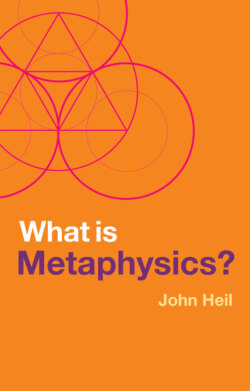Читать книгу What is Metaphysics? - John Heil - Страница 9
Acknowledgments
ОглавлениеWhat is Metaphysics? took shape in Melbourne during my tenure as a Fulbright Fellow in the first half of 2020. I am much indebted to the Australian–American Fulbright Commission and to Monash University, my host institution, for their support. The Fellowship, which was meant to run from mid-February through June, was cut short by the onset of the Covid-19 pandemic, but I remained in Australia with my wife, Harrison, and continued working from our adopted home in Caulfield South thanks to the graciousness of Marie-Thérèse Jensen. My stay at Monash would not have been possible without the support of Christina Twomey, Head of the School of Philosophical, Historical, and International Studies; Jakob Hohwy, Head, Department of Philosophy; and Jessica Weijers, School Manager, who deserves a gold parking pass.
I would not be the philosopher I am, and this book would not have been the book it is, had I not enjoyed the company of ten philosophers who are no longer around to read these words: David Armstrong, Donald Davidson, Fred Dretske, J. J. Gibson (whom I count as a philosopher), Jonathan Lowe, Charlie Martin, Norman Malcolm, Hugh Mellor, Mark Overvold, and Jack Smart.
Keith Campbell and John Bigelow, both important figures in Australian philosophy, have continued to exert a powerful gravitational pull on my thoughts, although not always in the same direction. I have also been influenced at close range by Jonathan Bennett, Alex Carruth, Randolph Clarke, Heather Dyke, Anthony Fisher, Frank Jackson, Jaegwon Kim, Anna Marmodoro, Yitzhak Melamed, Elizabeth Miller, Gonzalo Rodriguez-Pereyra, Peter Simons, Roy Sorensen, Galen Strawson, and Peter van Inwagen. I am most grateful to four anonymous readers who provided insightful advice and managed to convince me to temper my worst instincts, and to Ian Tuttle for finding and correcting numerous gaffes and infelicities. Harrison Hagan Heil suffered through successive versions of the book, offered invaluable counsel, and, more than anyone else, helped shape its character.
Pascal Porcheron, my editor at Polity Press, encouraged me to persevere in the project that resulted in this book. An old adage has it that the best way to learn something is to teach it. To the extent that this is true, it is true because you do not fully understand something until you can explain it to yourself, a prerequisite for teaching it to others. Writing this book afforded me the rare opportunity to do both, and for that I am especially grateful to Pascal and to Polity Press.
